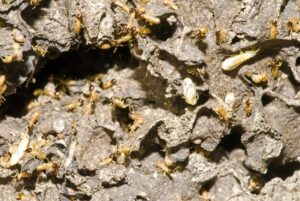
You should immediately contact a pest control company, if you suspect that your home has been affected by
termites. It's half the battle to confirm the existence of termites by having them checked out. Only experienced professionals can do it.
Once you have taken this crucial step, you will likely have questions about the exterminator's methods to eradicate termites and decrease the chance of them returning. Let's look at how long
termite control Myrtle Beach SC treatments can last, and what each method involves:
What is the average treatment duration for termites?
According to
exterminator Conway SC, termite treatments should last between one and five years. Some extermination methods can keep termites away for seven years or longer.
The difference lies in the method you choose. Bait-based exterminations kill termites and stop a new colony building up inside a property for one year. After that, it will be necessary to replenish the poisoned food supply. Although liquid treatments can last for up to five years, they are not guaranteed to be effective for more than seven to eight years. Whole-building methods like tenting (a.k.a. Fumigation or heat are not guaranteed to produce lasting results. The treatment may not be effective if termites return within a few days.
You should also consider whether any one of these
pest control methods is more effective than the others based on the length of treatment.
Different termite treatments offer different levels of effectiveness.
These are the most popular methods to get rid of termites in commercial and residential buildings. The liquid barrier treatment
A liquid treatment involves drilling holes around the perimeter of the property's ground floor and then saturating it with insecticide. This treatment is designed to eliminate termite colonies from the soil surrounding the structure. According to the
University of Kentucky termites in the property will not be able return to their colony or its moist soil after the treatment has been applied. They will eventually die of dehydration. It usually takes a few weeks to eradicate the infestation.
Liquid treatment is not feasible for all properties, especially in more urban areas like Brooklyn and Queens. The New York State Department of Environmental Conservation closely regulates the use of pesticides and other pesticides if groundwater is available.
Bait systems
Pest control professionals place cylindrical stations containing the bait (a mixture of cellulose, insecticide) around a structure. Sometimes they also place them indoors or in their mud tunnels. North Carolina State University stated that bait placements should not be more than 20 feet from each other. Termites will first eat the poisoned food and alert their colony members.
It takes time to use bait to exterminate a termite colony. This can take weeks or months. The stations need to be maintained and resupplied annually with bait. It is the best way to control the problem long-term, especially for subterranean termites, which are most prevalent in New York.
Tenting
Chemical fumigation involves covering a building with an aluminum tarp and then filling it with gas-based insecticide for several days. Tenting is still used but it can be dangerous to the environment and tenants' physical health.
Heat treatments
This method is considered to be environmentally friendly and involves infusing hot air into termite-infested buildings that are tarp-covered until the temperature reaches 140-150 degrees Fahrenheit. According to the California Department of Consumer Affairs, It is non-toxic but requires that people, pets, and other fragile items be removed from the structure. This may not always be possible for Queens or Brooklyn property owners.
For a termite consultation, contact Zap Pest Control Inc.
Zap Pest Control Inc.
2507 Forestbrook Rd Suite G
Myrtle Beach, SC 29588
843-654-1927
http://zappests.net/https://www.zappests.net/how-often-get-termites-treatment/
 You should immediately contact a pest control company, if you suspect that your home has been affected by termites. It's half the battle to confirm the existence of termites by having them checked out. Only experienced professionals can do it.
Once you have taken this crucial step, you will likely have questions about the exterminator's methods to eradicate termites and decrease the chance of them returning. Let's look at how long termite control Myrtle Beach SC treatments can last, and what each method involves:
You should immediately contact a pest control company, if you suspect that your home has been affected by termites. It's half the battle to confirm the existence of termites by having them checked out. Only experienced professionals can do it.
Once you have taken this crucial step, you will likely have questions about the exterminator's methods to eradicate termites and decrease the chance of them returning. Let's look at how long termite control Myrtle Beach SC treatments can last, and what each method involves:
 You should immediately contact a pest control company, if you suspect that your home has been affected by termites. It's half the battle to confirm the existence of termites by having them checked out. Only experienced professionals can do it.
Once you have taken this crucial step, you will likely have questions about the exterminator's methods to eradicate termites and decrease the chance of them returning. Let's look at how long termite control Myrtle Beach SC treatments can last, and what each method involves:
You should immediately contact a pest control company, if you suspect that your home has been affected by termites. It's half the battle to confirm the existence of termites by having them checked out. Only experienced professionals can do it.
Once you have taken this crucial step, you will likely have questions about the exterminator's methods to eradicate termites and decrease the chance of them returning. Let's look at how long termite control Myrtle Beach SC treatments can last, and what each method involves:

No comments:
Post a Comment